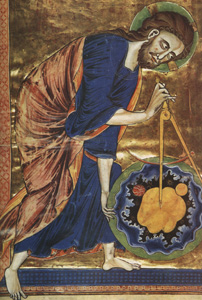


A powerful justification for the exploration of the Quadrivium during the Middle Ages and the Renaissance was the understanding that in the use of the mathematical disciplines the human mind was demonstrating its likeness to the divine mind. This idea is well brought out in the following passage from Nicholas of Cusa's On Learned Ignorance:
In creating the world, God used arithmetic, geometry, and likewise astronomy. (We ourselves also use these arts when we investigate the comparative relationships of objects, of elements, and of motions.) For through arithmetic God united things. Through geometry He shaped them, in order that they would thereby attain firmness, stability, and mobility in accordance with their conditions. Through music He proportioned things in such a way that there is not more earth in earth than water in water, air in air, and fire in fire, so that no one element is altogether reducible to another. As a result, it happens that the world-machine cannot perish.... And so, God, who created all things in number, weight, and measure [Wisdom 11:21] arranged the elements in an admirable order. (Number pertains to arithmetic, weight to music, measure to geometry).*
For Nicholas of Cusa, the human use of the mathematical disciplines "...are the works of that reason by which men surpass beasts, for brutes cannot number, weigh, and measure."* Echoing Platonic and Pythagorean ideas, Cusa notes: "If we have any knowledge of them [God's works], we derive it from the symbolism and the mirror of our mathematical knowledge."* "...[I]f number is removed, the distinctness, order, comparative relation and harmony of things cease; and the plurality of beings ceases,"* and "...reason could not proceed with its works, e.g., with building, measuring, and so on."* For Cusa, therefore, where the language of mathematics fails, nothing remains understandable or knowable to the human mind.
Cusa emphasized the likeness of man to God by seeing the parallel between God 's creation of the world and man's recreation in the products of human thought:
As God creates real entities and natural forms so man creates rational entities and artificial forms which do not exist except as a likeness of his intellect, as the creatures of God can only exist as a likeness of the divine mind. Therefore man has an intellect, which is the likeness of the divine intellect in creating. Hence man creates likenesses of the likenesses of the divine intellect, just as extrinsic artificial figures are likenesses of intrinsic natural forms.*
Cusa develops this same idea in his De coniecturis:
Conjectures ought to come forth from our mind as the real world comes forth from the divine and infinite reason. When indeed the human mind, the high likeness of God, participates as it is able in the fecundity of the creative nature, it puts forth from itself as the image of the omnipotent form rational entities in the likenesses of real beings. Thus, the human mind is the form of the conjectural world just as the divine mind is that of the real world. *
The French Humanists followed Cusa in emphasizing the importance of mathematics as a crucial tool to gain philosophical and theological truth. Charles de Bovelles wrote:
The mathematical disciplines should not be neglected for a moment... in ascertaining knowledge of both human and divine matters. Indeed to philosophize without the strong protection of mathematics...makes one an orphan.... For through mathematic examples...substantial acts and the first creative forms of things can be known... as well as the acts of being, living, feeling, and thinking which encompass all things under heaven.*
Gerard Roussel, a close companion of Lefèvre, echoes Cusa's ideas about the human mind as a likeness of the divine mind:
The Divine mind discerns all things. Likewise our own mind discerns all things. But the discernment of God is the production of things in their own subsistence. Our discernment, though, is only of numbers which are likenesses of the divine ones.*
Returning to the The Ambassadors, what Holbein presents on the table are the tools created by the mind of man to measure , map, and reproduce the world --not the world itself. The books and instruments are "the rational entities and artificial forms" of man's conceptual world created in the likeness of the world of "real entities and natural forms" that are the products of God's creation.
